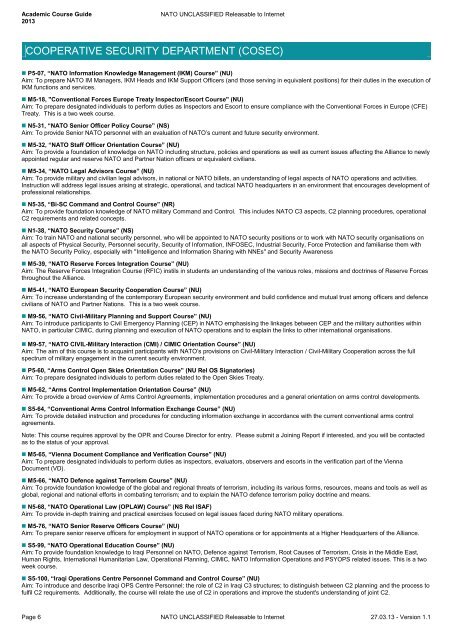Current%20Academic%20Course%20Guide
Current%20Academic%20Course%20Guide
Current%20Academic%20Course%20Guide
You also want an ePaper? Increase the reach of your titles
YUMPU automatically turns print PDFs into web optimized ePapers that Google loves.
Academic Course Guide<br />
2013<br />
NATO UNCLASSIFIED Releasable to Internet<br />
COOPERATIVE SECURITY DEPARTMENT (COSEC)<br />
P5-07, “NATO Information Knowledge Management (IKM) Course” (NU)<br />
Aim: To prepare NATO IM Managers, IKM Heads and IKM Support Officers (and those serving in equivalent positions) for their duties in the execution of<br />
IKM functions and services.<br />
M5-18, "Conventional Forces Europe Treaty Inspector/Escort Course" (NU)<br />
Aim: To prepare designated individuals to perform duties as Inspectors and Escort to ensure compliance with the Conventional Forces in Europe (CFE)<br />
Treaty. This is a two week course.<br />
N5-31, “NATO Senior Officer Policy Course” (NS)<br />
Aim: To provide Senior NATO personnel with an evaluation of NATO’s current and future security environment.<br />
M5-32, “NATO Staff Officer Orientation Course” (NU)<br />
Aim: To provide a foundation of knowledge on NATO including structure, policies and operations as well as current issues affecting the Alliance to newly<br />
appointed regular and reserve NATO and Partner Nation officers or equivalent civilians.<br />
M5-34, “NATO Legal Advisors Course” (NU)<br />
Aim: To provide military and civilian legal advisors, in national or NATO billets, an understanding of legal aspects of NATO operations and activities.<br />
Instruction will address legal issues arising at strategic, operational, and tactical NATO headquarters in an environment that encourages development of<br />
professional relationships.<br />
N5-35, “Bi-SC Command and Control Course” (NR)<br />
Aim: To provide foundation knowledge of NATO military Command and Control. This includes NATO C3 aspects, C2 planning procedures, operational<br />
C2 requirements and related concepts.<br />
N1-38, “NATO Security Course” (NS)<br />
Aim: To train NATO and national security personnel, who will be appointed to NATO security positions or to work with NATO security organisations on<br />
all aspects of Physical Security, Personnel security, Security of Information, INFOSEC, Industrial Security, Force Protection and familiarise them with<br />
the NATO Security Policy, especially with "Intelligence and Information Sharing with NNEs" and Security Awareness<br />
M5-39, “NATO Reserve Forces Integration Course” (NU)<br />
Aim: The Reserve Forces Integration Course (RFIC) instils in students an understanding of the various roles, missions and doctrines of Reserve Forces<br />
throughout the Alliance.<br />
M5-41, “NATO European Security Cooperation Course” (NU)<br />
Aim: To increase understanding of the contemporary European security environment and build confidence and mutual trust among officers and defence<br />
civilians of NATO and Partner Nations. This is a two week course.<br />
M9-56, “NATO Civil-Military Planning and Support Course” (NU)<br />
Aim: To introduce participants to Civil Emergency Planning (CEP) in NATO emphasising the linkages between CEP and the military authorities within<br />
NATO, in particular CIMIC, during planning and execution of NATO operations and to explain the links to other international organisations.<br />
M9-57, “NATO CIVIL-Military Interaction (CMI) / CIMIC Orientation Course” (NU)<br />
Aim: The aim of this course is to acquaint participants with NATO’s provisions on Civil-Military Interaction / Civil-Military Cooperation across the full<br />
spectrum of military engagement in the current security environment.<br />
P5-60, “Arms Control Open Skies Orientation Course” (NU Rel OS Signatories)<br />
Aim: To prepare designated individuals to perform duties related to the Open Skies Treaty.<br />
M5-62, “Arms Control Implementation Orientation Course” (NU)<br />
Aim: To provide a broad overview of Arms Control Agreements, implementation procedures and a general orientation on arms control developments.<br />
S5-64, “Conventional Arms Control Information Exchange Course” (NU)<br />
Aim: To provide detailed instruction and procedures for conducting information exchange in accordance with the current conventional arms control<br />
agreements.<br />
Note: This course requires approval by the OPR and Course Director for entry. Please submit a Joining Report if interested, and you will be contacted<br />
as to the status of your approval.<br />
M5-65, “Vienna Document Compliance and Verification Course” (NU)<br />
Aim: To prepare designated individuals to perform duties as inspectors, evaluators, observers and escorts in the verification part of the Vienna<br />
Document (VD).<br />
M5-66, “NATO Defence against Terrorism Course” (NU)<br />
Aim: To provide foundation knowledge of the global and regional threats of terrorism, including its various forms, resources, means and tools as well as<br />
global, regional and national efforts in combating terrorism; and to explain the NATO defence terrorism policy doctrine and means.<br />
N5-68, “NATO Operational Law (OPLAW) Course” (NS Rel ISAF)<br />
Aim: To provide in-depth training and practical exercises focused on legal issues faced during NATO military operations.<br />
M5-76, “NATO Senior Reserve Officers Course” (NU)<br />
Aim: To prepare senior reserve officers for employment in support of NATO operations or for appointments at a Higher Headquarters of the Alliance.<br />
S5-99, “NATO Operational Education Course” (NU)<br />
Aim: To provide foundation knowledge to Iraqi Personnel on NATO, Defence against Terrorism, Root Causes of Terrorism, Crisis in the Middle East,<br />
Human Rights, International Humanitarian Law, Operational Planning, CIMIC, NATO Information Operations and PSYOPS related issues. This is a two<br />
week course.<br />
S5-100, “Iraqi Operations Centre Personnel Command and Control Course” (NU)<br />
Aim: To introduce and describe Iraqi OPS Centre Personnel: the role of C2 in Iraqi C3 structures; to distinguish between C2 planning and the process to<br />
fulfil C2 requirements. Additionally, the course will relate the use of C2 in operations and improve the student's understanding of joint C2.<br />
Page 6 NATO UNCLASSIFIED Releasable to Internet<br />
27.03.13 - Version 1.1
















